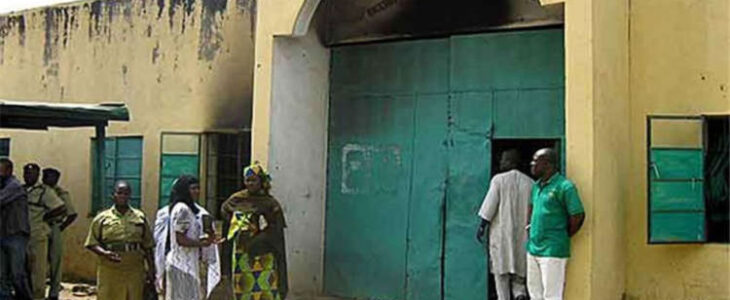
When gunmen bombed their way into Kuje prison freeing hundreds of inmates just 25 miles from Nigeria’s capital, Assumpta Mgbe who lives nearby huddled her children around her.
“The ground was shaking, and we could hear the sound of gunshots for more than 30 minutes,” said the 40-year-old woman who has spent two decades in the town where she owns a corner shop.

“No one expected it,” she said of the daring July 5 assault claimed by the Islamic State group affiliate in Nigeria, ISWAP, that usually operates far away in the northeast.
The insurgents have claimed several attacks in states surrounding the Federal Capital Territory over recent months, reminding the six million FCT population of more violent times they thought long gone.

Since Kuje, “people are afraid to come outside” to shop and it’s affecting Mgbe’s business as well as that of many others.
It’s not just ISWAP that worries residents but also heavily-armed criminals known as bandits who kidnap and kill.

“You don’t know what will happen and when it will happen, but everybody is just kind of apprehensive on a daily basis,” said Joseph Umeadi who works in an electronics repair shop in Kuje, off the main road.
In central Abuja, many taxi drivers like Segun Afolayan have stopped working at night.
“After six or seven (in the evening), everybody runs back to their houses,” said Afolayan, who has been driving in the capital for over 30 years. “Before it was not like that.”
– Patrols, checkpoints –
After the Kuje jailbreak that made global headlines and prompted President Muhammadu Buhari to say he was “disappointed” with his intelligence services, the police and military announced new measures to beef up security.
Early August, the Inspector-General of Police Usman Alkali Baba “ordered (the) massive deployment of additional police operatives and operational assets within the Federal Capital Territory and its environs.”

Defence spokesman Major General Benard Onyeuko also told FCT residents they were “undaunted and unrelenting” in “efforts to ensure the safety of lives and properties”.
But the patrols and checkpoints that appeared in Kuje last month have now vanished according to residents.
In central Abuja, the usual checkpoints that appear mostly at night are in place but there are no obvious signs of any additional ones.

For Kabir Adamu, security analyst with Beacon Consulting, a concern is that gunmen “could access the FCT through vulnerable points, ungoverned spaces”.
The capital, including the international airport, is surrounded by mountainous and forested areas that are difficult to patrol, but the police have said that “clearance operations” were underway.
– ‘Don’t feel safe’ –
Despite steps taken to try and prevent further incursions, some government workers are concerned about gangs and jihadists getting closer to the capital.
Daniel, a 37-year-old civil servant who asked to be identified only with his first name, said “before the present administration, things were quite safe”.
But now, “I don’t feel safe,” he said, stood outside a government building.
“You have soldiers and police everywhere but if it truly gets down to it, how prepared are they to stop such an event? No one really knows,” he added.

Another civil servant, Margaret Bassey, said the government was “not doing enough”.
“Our government is handicapped, they don’t know what to do,” she said.
Bassey, who travels two hours each day by bus to work and back, says she now leaves her office by four pm, to avoid being on the road at night.
“The situation now in Abuja is so bad, somebody can come right into your house and kidnap you… Even going to church, some people are scared of going to church,” she added.
– ‘Possible threat’ –
For years, Nigeria’s elite has been accused of employing too many policemen for their own security or as escorts.
One of former army general Buhari’s main election promises in 2015 was to end insecurity but violence has continued and spread under his watch.
The last time jihadists attacked Abuja was in 2014.
“If they manage to strike the heart of the nation once again, it would be seen as serious failure for Buhari and his party ahead of general elections in 2023,” said a Western diplomat who spoke on condition of anonymity.
“The authorities are taking steps and trying to reassure us but the situation remains preoccupying,” he told AFP.
Recent events “indicate a possible threat on Abuja, including on the international airport”.

Another key concern for residents are schools, a soft target for many gunmen across Nigeria.
Public and private schools in the FCT were instructed to shut early for the summer after the Kuje attack, and for now it’s unclear when they will reopen.
Credit: Yahoo News
